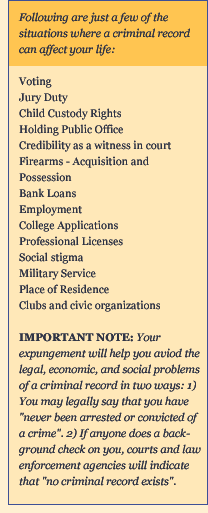
What is an expungement?
Simply put, an expungement is a legal way to "clear your record".
Under Georgia law (O.C.G.A.
section 35-3-37), all records on file in the criminal justice
system that relate to a criminal prosecution may be extracted and isolated.
Why do I need an expungement?
A criminal conviction may have an affect on your legal rights, economic
opportunities, and social situation. Many people discover the problems
a criminal record creates when they are trying to move forward with their
lives --applying for a job, license, or entrance to higher education.
It is important to obtain an expungement of criminal records as soon as
possible, well before one's past history will be reviewed or questioned.
It may be too late once an important opportunity or right is already lost.
Do the records just "disappear"?
No. All the expunged records are sent to a special facility for expunged
records. The records cannot be accessed for general law enforcement or
civil use. However, there are certain exceptional situations under which
the expunged records can be searched, retrieved, and used, but this is
rare and normally requires a court order or statutory authorization. One
way to look at it is, expunged records do not "disappear", but
they do "go away", and in most cases are never heard from again.
What kind records may be expunged?
Normally, records in any court, correctional facility, law enforcement
or criminal justice agency will be affected. Specifically, records regarding
a person's detection, apprehension, arrest, detention, trial or the disposition
of an offense within the criminal justice system are selected for expungement.
Other records, which may exist in a court, such as property deeds, or
civil lawsuits or judgements, will not be affected or expunged. In effect,
one's criminal record of arrest and/or conviction is erased and legally
deemed not to have occurred. Mental health records, which may affect one's
ability to purchase or possess firearms or obtain employment or licenses,
may also be expunged. The process is similar to the criminal history expungement.
Who is eligible for an expungement?
Expungement eligibility is a highly technical area. One should ask a
qualified attorney regarding one's specific facts situation. Generally
speaking, a person may have a criminal offense expunged if the proper
criteria is met. An arrest not resulting in a conviction may generally
be expunged without delay. There are offenses which may not be expunged.
There are also other various statutory limitations regarding expungement
which are too technical to list. The law of expungement and eligibility
is so complicated and contains so many exceptions, that only a qualified
lawyer should do the analysis of who is eligible and who is not.
How do I get an "Expungement"?
An expungement involves requesting an expungement of the arrest record
from the agency where such arrest occurred.
First, an investigation of the person's criminal history
is done to confirm eligibility for expungement.
Second, if an individual believes his or her criminal
records to be inaccurate or incomplete, he or she may request the original
agency having custody or control of the detail records to purge, modify,
or supplement them and to notify the georgia criminal information center
of such changes.
Third, should the agency decline to act or should the
individual believe the agency's decision to be unsatisfactory, the individual
or his or her attorney may, within 30 days of such decision, enter an
appeal to the superior court of the county of his or her residence or
to the court in the county where the agency exists, with notice to the
agency, to acquire an order by the court that the subject information
be expunged, modified, or supplemented by the agency of record. In most
cases, it is not necessary for the petitioner (the person seeking the
expungement) to appear. However, if any of the law enforcement, prosecutor,
or court offices object to the expungement, then legal briefs and oral
argument at the hearing may be required. The process normally takes about
3 months, but may take longer depending on the legal issues involved or
the particular court.
Can an expungement help me to lawfully possess firearms?
Yes - because an expungement removes the criminal conviction or mental
health record, it may have the effect of removing the disqualification
placed upon a "convicted person" from purchasing or possessing
firearms under the firearm licensing law of Georgia and under the firearm
possessory law of Georgia. A State expungement also removes the Federal
disqualification for convicted felons purchasing or possessing firearms.
At one time an individual needed a Federal relief from disabilities even
though they had a State expungement. Under the 1986 Gun Owners Protection
Act, this was changed so that the Federal Government recognizes State
expungement. This express recognition may be found under the U.S.C.A.
Title 18, 921(a)(20). Expungement of an otherwise qualifying offense also
removes one from being subjected to the Lautenberg Domestic Violence Misdemeanor
Gun Ban..
Call my office at (404)633-2057 to schedule a FREE CONSULTATION to find
out whether you are eligible for an expungement.
|




